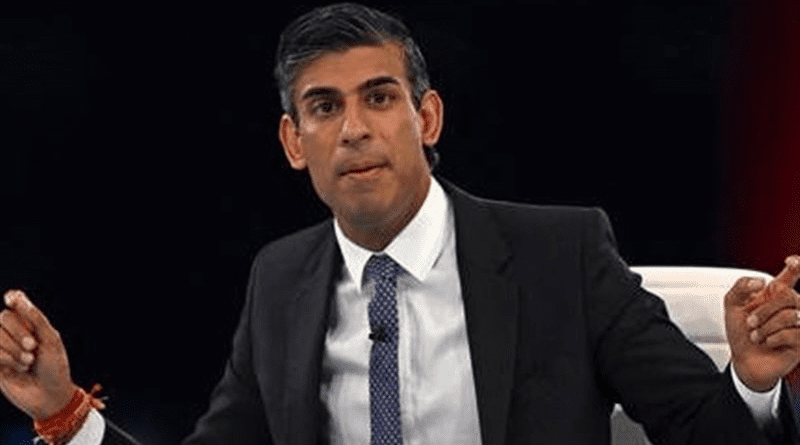UK Prime Minister Rishi Sunak’s Hold On Power Already Under Threat – OpEd
By Arab News
By Andrew Hammond*
Since the end of the Second World War, most UK governments have generally been brought down by economic challenges, including in 1970, 1974, 1979 and 2010, or sleaze/ethics crises, as in 1964 and 1997. However, the scale of the problems of current Prime Minister Rishi Sunak’s administration is underlined by the fact that it is currently failing on both counts.
After the UK’s political roller coaster in 2022, the conventional wisdom was that Sunak’s prime ministership might augur a period of more stable government. However, January has seen intensified Tory turmoil that may yet threaten his hold on power sooner than expected.
It has been clear for months that the government faces a tough economic landscape in 2023, with the significant prospect of recession. However, what was not widely expected, at the outset of Sunak’s prime ministership, was the degree to which sleaze would consume his top team.
While a general election may not be due until the end of 2024 or early 2025, this is already having a clear political impact. For, after about 100 days in office, the prime minister’s approval ratings fell to his lowest ever level of -15 this week, according to one poll.
Although Sunak’s administration is barely three months old, it has already been rocked by an unusually large number of ethics-related challenges for senior ministers. This includes Sunak himself, who was last week fined for not wearing a seat belt while being driven in a car — his second fixed penalty in a year after police found him guilty last year of breaking pandemic rules alongside his predecessor in 10 Downing Street, Boris Johnson.
While some regard these offences as relatively minor, the challenge for Sunak is that they come in a wider context. Cabinet Office minister Gavin Williamson resigned in November after serious bullying allegations mounted, Deputy Prime Minister Dominic Raab is under investigation over similar allegations, Conservative Party Chairman Nadhim Zahawi faces growing questions over his finances, and Home Secretary Suella Braverman was reappointed after multiple breaches of the ministerial code.
Such is the scale of these so-called sleaze challenges that parallels have been drawn between Sunak’s predicament in 2023 and that of then-Prime Minister John Major, who lost power in 1997 in an election landslide to Tony Blair’s Labour team. While there are some similarities, what is troubling for Sunak is that — unlike Major in 1997 — he also has a second major problem of a flatlining economy.
This was confirmed on Tuesday, when data showed that UK private sector business activity this month suffered its sharpest drop in two years. Preliminary information from the purchasing managers’ index underlines that the UK’s economic downturn in January has been worse than expected, showing the fastest rate of decline since the January 2021 coronavirus lockdown.
The net impact of these woes is a darkening political outlook for Sunak. To be sure, the UK is unlikely to see a repeat of 2022, which was the first year in more than a century and a half (since 1868) that three prime ministers resided in 10 Downing Street. However, there may continue to be high levels of governmental instability. So, while Sunak wants to try to last in power until the next election at least, it remains possible his government may collapse this year.
A key danger point for him is the May local elections. If the results are very poor for the Conservatives, there will be growing demands within the party for a change of leader. Yet, at the same time, Conservatives will also know that, should this happen, there would be an increased clamor for an immediate general election. This is because there have already been two changes of prime minister since the last election in December 2019.
The last time the country was in this leadership territory was in the prewar era, when Stanley Baldwin won the 1935 election before handing power to Neville Chamberlain two years later. He in turn passed the baton to Winston Churchill in 1940, after the outbreak of war. What was perceived as legitimate in wartime, however, has less democratic respectability in peacetime more than 80 years later.
It is partly for this reason that, if the Conservatives do try to change leaders again this year or next, it may well be Johnson they turn to. The former prime minister would seek to argue that he still has a democratic mandate from the 2019 election and can still deliver for the party.
What makes Johnson’s appeal so potentially potent to the Conservatives is that he was turfed out of Downing Street in 2022, not by losing a national ballot but because he was replaced in an internal party vote, which may be regretted by increasing numbers of Tory members if Sunak underwhelms in office, and especially if May’s local election results are very poor.
- Andrew Hammond is an Associate at LSE IDEAS at the London School of Economics

